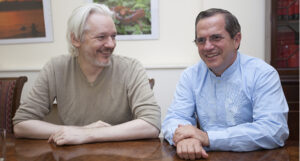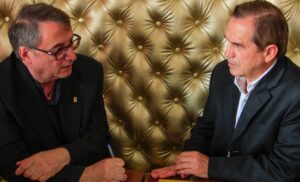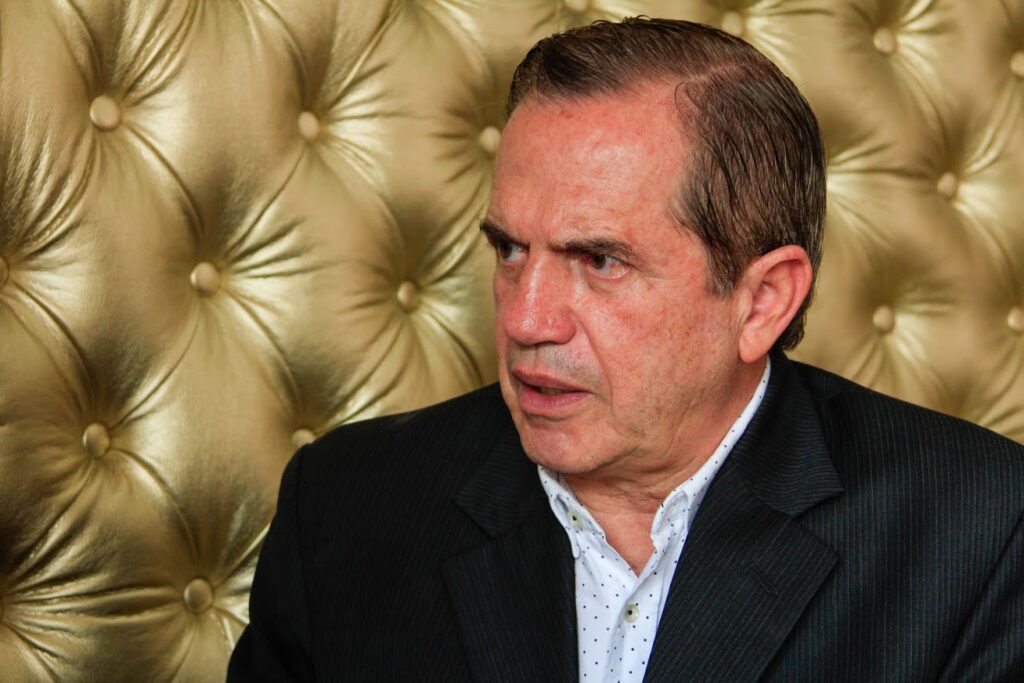14.06.2019 - 09:56
|
Actualització: 14.06.2019 - 11:56
The decision by the current government of Ecuador to revoke Julian Assange’s political asylum and hand him over to British police has sent shockwaves across the world and paved the way for the WikiLeaks founder to be extradited to the US, an intention that was confirmed yesterday by Downing St.
However, this decision is not unrelated to recent events in Ecuador. In 2017 PAIS Alliance candidate Lenin Moreno was elected president of Ecuador. As he took over from Rafael Correa, his predecessor, Moreno’s victory was seen as a continuation of the so-called Citizen Revolution Movement. However —and much to everyone’s surprise—, he quickly turned against his former allies, reverting the political process they had begun ten years earlier and even persecuting them.
As a result, former president Correa himself remains exiled in Brussels and several prominent former cabinet members are either in jail or have fled the country. This newspaper has managed to track down one of the top names, former Foreign, Defence and Economy minister Ricardo Patiño. Patiño was the president of PAIS Alliance during the clash with Lenin Moreno, after the latter was elected president of Ecuador.
—You granted Julian Assange political asylum. How do you feel about the recent events?
—I am very upset and concerned. The current government of Ecuador, led by Lenin Moreno, has violated the constitution and international law. Once a state has granted someone political asylum, this cannot be revoked. Furthermore, you need to realise that Julian Assange is an Ecuadorian citizen, which means that an Ecuadorian national has been handed over to the British authorities, a decision that constitutes an extremely serious violation of my country’s constitution.
—What do you think will happen next?
—I am absolutely certain that Assange will be sent to the US. And they will keep him there. These recent events are evidence that Assange needed protection when we, the government of Ecuador, gave it to him.
—How did you come to that decision?
—Assange applied for asylum in many countries, as he realised that everything that WikiLeaks exposed had bothered and irritated the US. We granted him the status of political refugee on principle. President Correa was well aware of the risks involved, but we also knew that Julian Assange might be prosecuted for his actions, that he might be tortured, that if the US laid hands on him, he might end up in some off-shore facility, such as Guantanamo Bay, set up precisely to have a free hand in cases like this. And I mean a free hand in every sense of the word. So we knew he was in real danger, as will be confirmed now; and that’s why we granted him political asylum. Right then the US obviously decided that Ecuador had crossed a line.
—That decision spelled trouble for Ecuador right off the bat …
—The hardest moment of all was precisely when Assange entered our embassy in London. We were examining his asylum application, I believe little over one month had passed, and the British government threatened to break into our embassy. They put it in writing because they had to extradite Assange to Sweden. Our reaction was to convene the Bolivarian Alliance for the Peoples of Our America (ALBA), the Union of South American Nations (USAN) and the Organization of American States (OAS). Everyone knows that the USA wields much power within the OAS, but we beat them in all three forums. The US and Canada refrained from voting because our position garnered so much support among the members states that they simply didn’t stand a chance. Once these American institutions had taken a stand on the matter, the British dropped the idea of breaking into our embassy, but they remained totally reluctant to dialogue. They never even agreed to discuss the possibility of a safe-conduct that would have allowed Assange to leave the embassy and fly to Ecuador. At the time I held a number of talks with the Foreign Office and they always made it clear that they had no intention of engaging in a dialogue.
—Ecuador stood up for Assange’s rights, but he was forced to live in very harsh personal circumstances, spending years in a room.
—We made it possible for him to work, to meet people … Back then, we were under fire from Ecuador’s conservative opposition, even about the cost of Assange’s meals, as well as the sum we spent on security, even though it was obvious that you couldn’t leave someone like Assange unprotected. Anybody could have attempted on his life and we just couldn’t tolerate that sort of thing. Granting asylum means offering protection and, therefore, we were duty-bound to do that. The one reason why you offer someone asylum is because, clearly, they are being persecuted. Otherwise, it is pointless.
—Why do you think the current president of Ecuador, Lenin Moreno, has revoked his status and handed Assange over to the British authorities?
—I’m convinced that Lenin Moreno had agreed with the US, long before being elected president, that he would expel Assange from the embassy.
—While you were together in the government, did Moreno ever indicate that he opposed granting asylum to Assange?
—Never! Not once. However, it’s very interesting how, as soon as he took office, he immediately voiced his disagreement about Assange’s presence in our embassy.
—At one point there was some controversy over Assange’s actions, such as when he publicly supported Catalonia’s referendum of self-determination. Did that have any bearing on his situation? Some claimed he was contravening the rules on which he had been granted asylum.
—That’s not true. I know many people have said that, but it’s not true.
—Do you fear for his life?
—Every day we are more certain that we did the right thing granting Assange political asylum. And I must say that I don’t think that a conservative government in Ecuador would dare to do what Lenin Moreno has done. I think a right-wing government would have respected Assange’s status.

Julian Assange and Ricardo Patiño in Ecuador’s embassy in London, on the second anniversary of his arrival at the legation.
—Do you have any explanation for Lenin Moreno’s U-turn on Assange. The man we knew campaigning with you for PAIS Alliance bears little resemblance to today’s president.
—It’s not just that Moreno has completely ignored our election manifesto. It’s worse than that. Moreno is implementing the right’s policies, the manifesto on which the two conservative parties ran and lost the elections. And he is doing that on an economic, social and institutional level. Lenin Moreno has taken onboard all the policies espoused by the right before the polls: cutting the electricity rates for large corporations, raising the price of petrol, taking the power over electronic currency from the central bank and handing it over to private banks, which have been given a free hand to set interest rates, fees and so on; sacking the members of the Council for Citizen Participation, putting a cap on the number of terms which the president of the republic may serve … Moreno has endorsed the entire manifesto of the conservative parties that lost the elections because voters preferred the policies that Moreno himself stood for, that we stood for, during the campaign.
—How do you explain that? Does it make any sense to you?
—We can’t understand how someone who used to brag about being part of the Citizen Revolution, who used to call it “a legend” and used to say that he was part of the “Rafael Correa legend” can possibly be doing what he is doing. He knows us personally, he knows we are committed to the people on principle, that we are not criminals at all. So, why then? Inevitably you must wonder at what point he began to work with the CIA, as that’s exactly what he has done, at what point he and the CIA agreed to take down the Citizen Revolution project that we had built over a ten-year period. I can’t say what happened, but it is a fact that members of his inner circle were exposed by WikiLeaks as CIA informers, including Andrés Michelena, the current Telecommunications minister.
—Surely that can’t have happened overnight. It wouldn’t make sense.
—Obviously he lied to us, which is bad. But the fact that he lied to the public, to the electorate, is even worse. Clearly he was lying on the campaign trail, when he described the policies he knew he’d disregard because he was plotting to try and take down the Citizen Revolution.
—Could the funding he might have received possibly account for that?
—I get the feeling that his personal connections, as a young man, with people who belonged to Ecuador’s traditional circles of power have played a major role. When we were in the government together sometimes he would say that he was off to chat with some friends, the sort of people we call “poshos”, very wealthy, very important people. And he used to say that he’d go down and listen to them, to find out what they thought so that the government would have a better picture of what was going on in the country. But everything suggests there was more to it than that. They had been plotting for some time and he was lying to us. He used that argument to conceal the true nature of that relationship.
—Do you think you made a mistake by trusting him and choosing him to be the candidate of your movement?
—We certainly did. We were very naïve. Some of us knew each other well, we went back a long way. But him, not so much. He seemed to have very solid humanistic principles, he was someone who had been shot and had overcome the physical disability caused by that. He was a very inspiring public speaker. We felt that was a very important quality. But, truly, we were very naïve. There’s no denying that.
—Is the Assange case the key to everything that’s happened? Do you get the feeling that the US waited patiently for the right person to come along at the right time?
—There was probably a combination of factors. Of course, Assange being one. But I believe that the US had it in for us ever since we shut down the US military base in Manta. Remember that the US ambassador was expelled, together with a contingent of fifty US troops that she kept in the embassy and we learnt about nearly by chance. This group sought to infiltrate our armed forces.
—How do you mean “by chance”?
—By chance! We had trouble with an army helicopter and there was an American onboard. Obviously, we asked how come a “gringo” was on one of our choppers. We were told he was one of the troops from the embassy. And it was then that we began to take steps. We are not talking about a military attaché or a technical advisor, but a fifty-strong unit operating within our country.
—And Assange came after that …
span class=”s4″>—In 2012, three years after shutting down the base, I personally announced that we were granting political asylum to Assange. Right then it seems that the US decided they’d had enough. Yes, they did.
—Your situation at present is very complex on a personal level. President Correa is in exile, some of your colleagues are in jail …
—Luckily nowadays modern technology allows us to communicate and get our message across to the people. But, needless to say, it’s not quite the same thing. I used to travel up and down the provinces all the time, talking to our people, listening to them, whereas no human contact is possible from behind a screen.
—That’s why you’ve been forced into exile.
—Sure. But I must add that this treacherous government has only been in office for two years and we have already had some positive election results. We have won in two of the three largest prefectures of the country, including the capital city. And we have set up a Council of Citizen Participation, which is very democratic and will likely take steps to mend the deinstitutionalisation caused by Moreno’s administration. We look forward to the 2021 elections.

Vicent Partal and Ricardo Patiño
—Yet everything becomes very complicated when a government shuns politics and, instead, resorts to a court of law to meddle in an election.
—Absolutely! It’s extremely hard! And I should add it is impossible to achieve that without the cooperation of news outlets. The press peddles lies and it is responsible for creating the conditions for society to accept as normal what is not: that some person is kept in jail or is assassinated, even. In Ecuador you have people saying Correa should be killed, Patiño should be killed, like it’s nothing. There is a very persistent campaign to portray Correa supporters as if they were guilty of whatever crimes, as if they were thieves. And when all the media have completed their massive campaign to ruin your reputation, then comes a judge and he cannot hand down a not-guilty verdict, even if he believes you are innocent. Otherwise he would suffer a merciless media bombardment and the elements of the justice system that are controlled by the government would also take action.
—How would you define this phenomenon that we are experiencing at the same time in several countries across the world?
—I think we need to realise that, apart from the judicialisation of politics, we are witnessing the birth of a political mafia. This mafia knows no boundaries, it will destroy your family if necessary, they will steal any personal assets you may have acquired during your life, if they think they will hurt you that way. Their goal is to destroy you and scare off anyone willing to put up a fight or willing to support you. There are former government ministers who say they are very sorry about what is happening, but they don’t want any trouble because they have young children and they have been threatened unless they comply or get out of the way.
—In fact, we are seeing this in Hong-Kong, Turkey, in Spain with Catalonia, in Ecuador: it’s like a state has emerged within the state and it’s politically unaccountable and above the rule of law.
—Early on in Ecuador, this government called a popular consultation that required the prior approval of the Constitutional Court. But, as the Court refused to give its approval, they just ignored it. So, to begin with, you have an unconstitutional consultation that, on the surface, aims to uphold the constitution. Then they go on to win the ballot, even though we got 37 per cent of the vote despite the smear campaign against us. They they start taking decisions that violate the constitution. For instance, they decided that the Council of Citizen Participation can hold to account its former members and not just the incumbent ones. At any rate, all that should have been done by the book, acknowledging the right to defence and due process. But they ignored all that. From a legal standpoint, they had six months to carry out an evaluation of that nature, but it took them thirteen. The process is out of control, unstoppable. They’ve broken the law, violated the constitution and there is not stopping them. And they have presented the facts as the exact opposite of what they are. They have broken the rules, but use the press and the judges to accuse us of exactly that.
—What’s your outlook on the situation?
—Optimism remains our obsession. We have believed in justice all our lives and nobody will change that. Despite everything, people in Ecuador know that the Citizen Revolution has changed our country and I’m not just talking about improving infrastructures, but also about the dignity of the people. And it’s not so easy to wipe that away. And, obviously, such an exceptional situation brings about exceptional reactions. President Correa had decided to spend more time with his family, take some time off, but a few days ago he announced that he was willing to lead again. It’s true that, precisely due to the result of the consultation I mentioned earlier, he would not be allowed to run for president in the 2021 elections. But he could be the vice president or the president of the parliament. And he is an extremely strong leader, one which the people love very much. We’ll get through this. I don’t know when it’ll happen, but we’ll get through it. I’ve no doubt about it.


